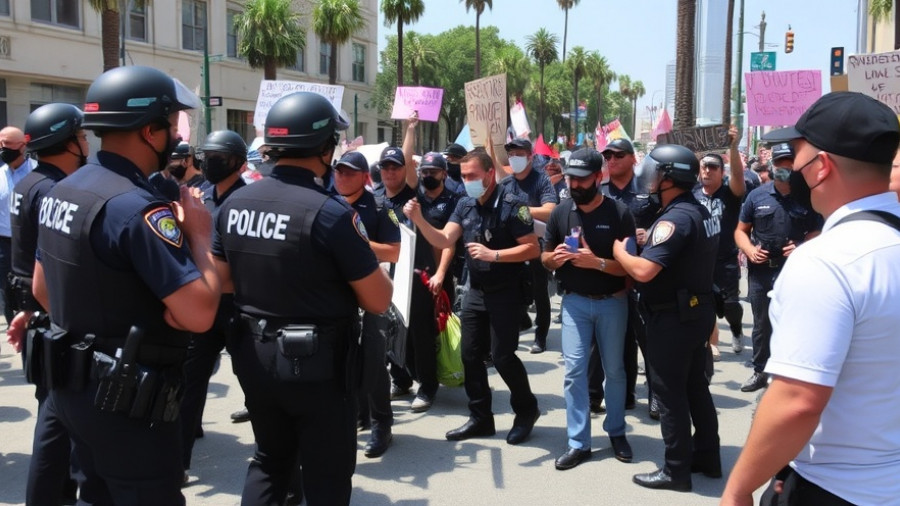
The Echo of Protest in Los Angeles: A Night of Tension
The streets of downtown Los Angeles transformed from a scene of vibrant expression to one of tension and conflict as protesters gathered near the federal building following the conclusion of a widely attended "No Kings" rally. The atmosphere was electric as groups of protesters, some adorned in symbolic attire referencing reproductive rights, chanted and animatedly addressed their demands for the Los Angeles Police Department to denounce U.S. Immigration and Customs Enforcement (ICE).
The Gathering Storm: Understanding the Context
Earlier in the day, thousands of individuals participated in the peaceful "No Kings" demonstration, aimed broadly against perceived abuses of power by the Trump administration. Participants, including a diverse coalition of activist groups such as Black Lives Matter Los Angeles and various labor organizations, showcased creativity and humor through giant balloons and handmade signs. The event highlighted deep-seated frustrations over government policies and a united call for social justice.
A Shift from Peacefulness to Friction
As daylight faded, a smaller group lingered at the intersection of Alameda and Aliso Streets. The LAPD reportedly issued multiple orders for the crowd to disperse, citing concerns that some individuals were directing lasers and industrial lights at officers and even their helicopters. This marked a transition from a celebratory protest to a volatile confrontation.
When officers moved in to enforce the dispersal orders, tensions escalated. Footage captured from the scene revealed skirmishes, including the use of non-lethal projectiles, as officers attempted to control the crowd. Among those detained was Jennifer Johnson, a peaceful protester who shared her story of being forcibly removed after she chose to stay seated, symbolizing resistance.
Voices of the Protest: Expressing Sentiments through Actions
Amid the chaos, the voices of the protesters remained resolute. Individuals like Johnson emphasized their intention to exercise their Constitutional rights peacefully. The sentiment echoed across various individuals who had attended the rally, reflecting a mix of fear and determination among marginalized communities concerned about ICE raids and deportations.
Community Support and Its Role in Protests
Such protests, particularly against a backdrop of heightened tensions with law enforcement, serve a critical function in fostering community support and building solidarity. Many attendees of the "No Kings" rally expressed that their participation is rooted in personal experiences of discrimination, fear of authority, and a desire for change.
Grassroots movements have proven effective in bringing people together, bolstering feelings of safety in numbers. This rally, like many others, allowed individuals to find their voice in the ongoing conversation about governance and civil liberties.
Looking Ahead: The Future of Civil Disobedience in America
As protests continue across the nation in response to various governmental actions, it’s crucial to consider the implications of civil disobedience in modern democracy. The "No Kings" protests present a case study of how collective action serves not only as an avenue for direct expression but also as a mechanism to spark dialogues about reform.
The question lingers: What does the future hold for the relationship between law enforcement and protesters? With the current social climate as a backdrop, ongoing protests may lead to essential discussions and reforms. It is vital for communities to remain engaged and vigilant in fostering dialogue and working collaboratively towards social justice, even amidst challenges.
Community Resources and Calls to Action
Everyone can play a part in contributing to a better understanding of these issues through community involvement. Educating oneself on local advocacy groups or participating in peaceful events can amplify the voices that seek positive change. For those in and around Bakersfield, consider joining local organizations that focus on this dialogue, participate in town hall meetings, or support policies that align with the values of justice and equity.
 Add Row
Add Row  Add
Add 



Write A Comment